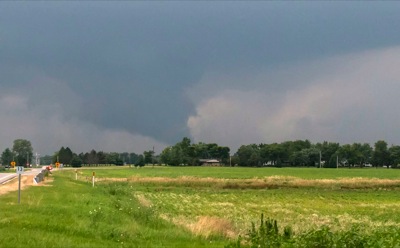Tuesday, July 11th, 2017
Celina council OKs golf cart ordinance
By William Kincaid
CELINA - City council members on Monday night approved on a 4-3 vote final reading of legislation to permit "multi-use vehicles," including golf carts, onto city streets where the speed limit is 25 mph or slower.
They also sent to committee an ordinance that would prohibit marijuana cultivators, processors and/or retail dispensaries licensed by the state within city limits, agreeing discussion was needed before voting on the legislation.
On the multi-use vehicle ordinance's final reading, councilor June Scott, who previously had voted yes, joined dissenting colleagues Myron Buxton and Mark Fleck in voting against the proposal. All three men felt safety concerns outweighed the potential benefits of allowing people to drive such vehicles on city streets.
Scott said most people to whom he had talked opposed the idea.
Also, Buxton said almost everyone who had approached him opposed allowing the vehicles in town. One of those detractors, Buxton said, told him, "don't change a law because a couple people want to who are already breaking the law just because they want the law changed."
Councilmen Mike Sovinski and Jeff Larmore, too, had safety concerns but agreed council members could later revisit the legislation if any major issues or problems arise.
"You don't totally restrict use of something because there's accidents with it because people can have accidents walking down the sidewalk or driving a car," Sovinski said. "You don't hear anybody talking about denying the use of those ... because you can have accidents."
The legislation, which will take effect in 30 days, was drafted in response to a request from mayor Jeff Hazel, who had said that a resident had asked him if he could drive his street-legal golf cart in town.
Though permitted by state law, golf carts must also be allowed by a municipality to use its streets.
Hazel had said city administrators are not necessarily taking a position. They've simply heard from residents who are asking the reason why they can't drive licensed golf carts in Celina while people in Fort Recovery and Rockford are allowed to do so.
The ordinance defines multi-use vehicles, in part, as under-speed vehicles "with an attainable speed on a paved level surface of not more than 20 mph and with a gross vehicle weight rating less than 3,000 pounds." They include Rangers; Razors; Gators, with beds to transport material or cargo; and mini-trucks, a four-wheeled vehicle propelled by an electric motor.
Multi-use vehicles will need to pass a police inspection before being allowed onto city streets. During inspection, the owner will need to present a valid driver's license, proof of insurance and a $25 inspection fee.
Out-of-state multi-use vehicles will not be permitted on city streets.
All multi-use vehicles will need to be equipped with brake lights, taillights, headlights, turn signals, white rear license plate light, horn, rearview mirror, windshield, brakes, steering mechanism, seatbelts, child restraints if applicable and appropriate tires.
Also, drivers found to have "modified" or altered multi-use vehicles after the issuance of a permit could ultimately have their permits revoked by police chief Tom Wale.
Wale, at the last regular council meeting, had made it very clear that multi-use vehicles will be regulated like any other vehicle, and unlawful operation will not be tolerated. Operators found to be under the influence, driving recklessly or violating any other traffic law can expect to be cited and prosecuted, he had said.
A violation of the ordinance would result in a minor misdemeanor punishable by a fine of at least $100.
Council members on Monday night also decided to send to the committee of a whole an ordinance that would prohibit marijuana cultivators, processors and/or retail dispensaries licensed by the state within the municipal corporation, agreeing discussion was needed before voting on the legislation.
A meeting time has not been set.
"I have a lot of questions about this as well," councilman June Scott said
Sovinski and Fleck agreed.
"I think that the topic needs discussion further beyond what we have time at these meetings," Sovinski said.

